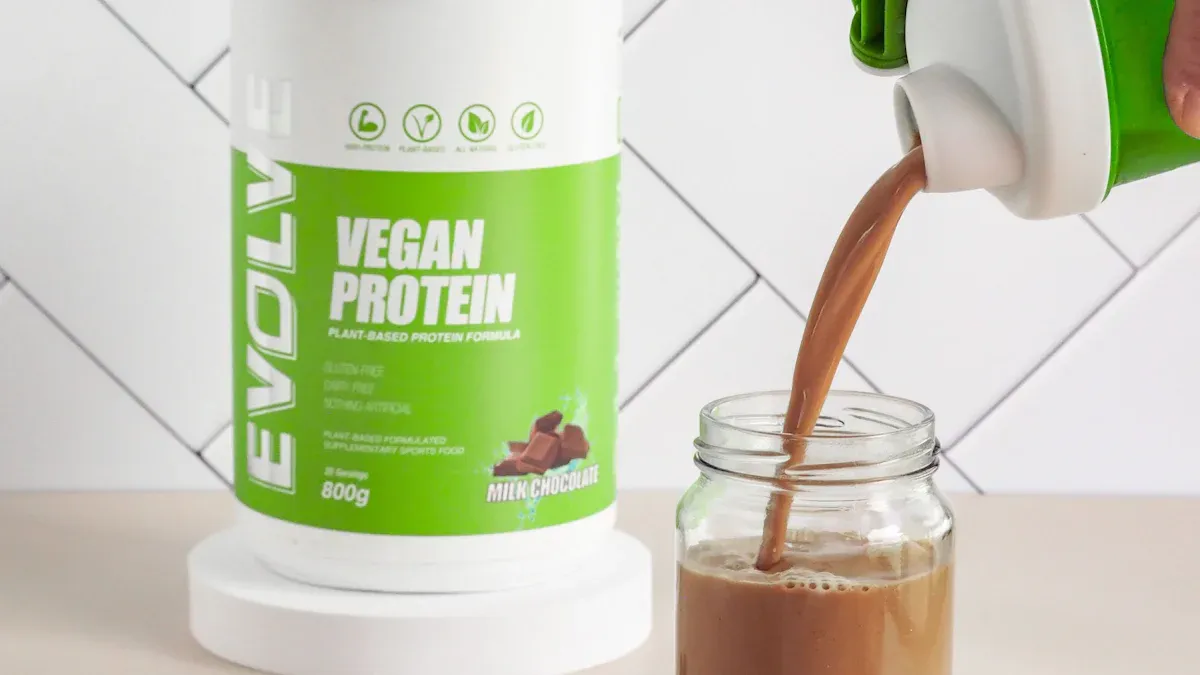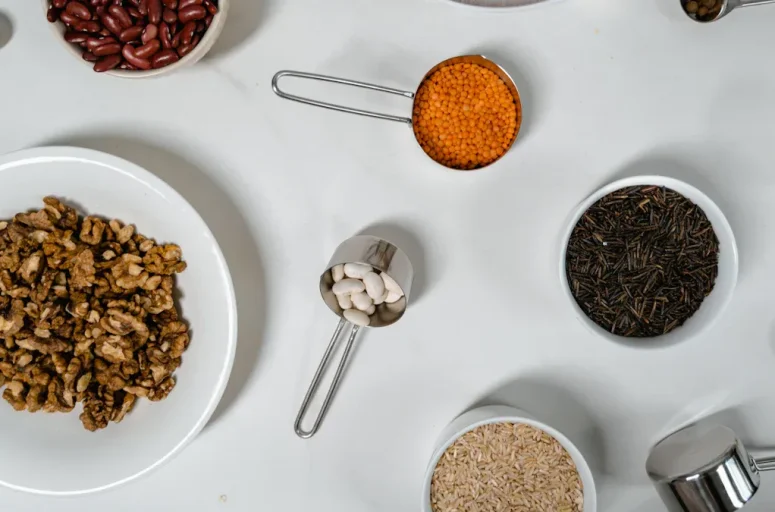
You may wonder about the recommended l-glutamine dosage for leaky gut. Experts suggest taking 5 to 10 grams of l-glutamine daily, divided into one or two servings. This amount supports your gut lining and helps manage leaky gut without causing tolerance issues. Most guidelines favor powder forms, which allow accurate measurement. Higher doses of l-glutamine are not standard for leaky gut and are reserved for specific medical conditions. Always remember, this information is for educational purposes only. Consult your healthcare professional before changing your supplement routine.
Key Takeaways
Take 5 to 10 grams of l-glutamine daily, split into two servings, to support your gut lining safely.
Higher doses (15 to 30 grams) are for therapeutic use and should only be taken under medical supervision.
Divide your l-glutamine dose into morning and evening servings on an empty stomach for best absorption.
Choose high-quality, pure l-glutamine supplements with third-party testing to protect your gut health.
Avoid overdosing or inconsistent use to prevent side effects and get the full benefits for leaky gut.
Combine l-glutamine with a healthy diet, stress management, hydration, and good sleep for better results.
Consult your healthcare provider before starting l-glutamine, especially if you have health conditions or take medications.
Track your symptoms and progress to see how l-glutamine supports your gut repair and overall health.
L-glutamine dosage for leaky gut
Dosage ranges
When you consider l-glutamine dosage for leaky gut, you find a wide range of recommended intake levels in clinical studies. Most research supports using 15 to 30 grams of l-glutamine per day for therapeutic purposes. You usually take this amount on an empty stomach to help your gut lining repair and reduce intestinal permeability. Some protocols suggest lower daily intake, such as 5 to 10 grams, especially for maintenance or mild symptoms. The recommended intake depends on your health status, goals, and the advice of your healthcare provider.
Maintenance and therapeutic doses
You may use l-glutamine supplement for maintenance or for therapeutic purposes. Maintenance doses help you support gut health over time. Therapeutic doses target active symptoms of leaky gut and promote faster recovery. The table below shows the differences between these protocols:
Protocol Type | Timing of L-Glutamine Administration | Dose | Key Findings |
|---|---|---|---|
Maintenance/Preventive | 1 hour before stress or exercise | Single dose 1 g/kg | Moderate reduction in tissue damage; less effective than therapeutic dosing |
Therapeutic | 1 hour after stress or exercise | Single dose 1 g/kg | Greater reduction in organ and muscle damage; better recovery outcomes |
High-dose (clinical) | Ongoing, for chronic conditions | 15–30 g/day | Significant improvement in gut symptoms and barrier function; used for severe cases |
You should know that therapeutic dosage of l-glutamine is usually higher and temporary. Maintenance doses are lower and suitable for long-term daily intake.
High-dose protocols
Some medical conditions require high-dose protocols. For example, patients with chronic intestinal pseudo-obstruction have received up to 30 grams of l-glutamine per day for several months. These high doses improve mitochondrial function and cell survival. You should only use high-dose l-glutamine supplement under medical supervision. For most people with leaky gut, the recommended intake stays within the 5 to 15 grams per day range.
Body weight-based dosing
You can also calculate l-glutamine dosage based on your body weight. Experts recommend about 0.5 grams of glutamine per kilogram of body weight per day for adults with leaky gut. If you weigh 50 kg, you would take about 25 grams of glutamine per day. This approach helps you personalize your daily intake and ensures you get enough supplemental glutamine for therapeutic effects. You should divide this amount into two servings and take them with meals.
Divided doses
You benefit most from l-glutamine supplement when you split your daily intake into multiple servings. Dividing l-glutamine doses into two or three servings each day improves absorption and supports gut health. You should take l-glutamine on an empty stomach for best results. Splitting your glutamine per day helps maintain a steady supply for your intestinal cells. These cells use l-glutamine as their main fuel source. Divided doses also support mucin production, strengthen your gut barrier, and reduce the risk of side effects. You get more consistent benefits throughout the day.
Tip: Divide your l-glutamine supplement into morning and evening servings. This routine helps you maintain gut health and avoid digestive discomfort.
You should always follow the recommended intake and consult your healthcare provider before starting any new supplement. The right l-glutamine dosage for leaky gut depends on your needs, body weight, and health status.
Medical Disclaimer:
This information is for educational purposes only. It does not constitute medical advice. You should consult a healthcare professional before making any changes to your supplement or health regimen.
Why l-glutamine for leaky gut
Gut lining support
You need a strong gut lining to keep your digestive system healthy. L-glutamine plays a key role in gut repair by fueling the cells that line your intestines. These cells, called enterocytes, use l-glutamine as their main energy source. When you take l-glutamine for leaky gut, you help your body rebuild and maintain the intestinal lining. This process prevents harmful substances from leaking into your bloodstream, which can trigger inflammation and other health problems.
L-glutamine also helps your body produce tight junction proteins like claudin-1, occludin, and ZO-1. These proteins act like gatekeepers, holding the cells of your gut lining together. When your body does not have enough l-glutamine, these proteins break down, and your gut becomes more permeable. This condition, known as intestinal hyper-permeability or leaky gut syndrome, allows toxins and bacteria to pass through the gut barrier. By supporting tight junctions, l-glutamine strengthens your gut barrier function and reduces the risk of leaky gut.
Scientific evidence
Researchers have studied l-glutamine for leaky gut syndrome in both lab and clinical settings. You can find strong evidence that l-glutamine supports gut health and gut repair. For example:
A randomized controlled trial with 115 people who had IBS found that taking 15 grams of l-glutamine daily for eight weeks improved symptoms and normalized intestinal permeability.
Nearly 80% of people in the l-glutamine group saw a reduction in leaky gut syndrome.
L-glutamine supplementation reduced daily bowel movements and improved stool consistency.
Clinical studies show that l-glutamine helps repair the intestinal lining, reduces inflammation, and supports gut barrier function.
Experts recommend doses between 15 and 30 grams per day for gut repair, usually taken on an empty stomach.
These findings show that l-glutamine can help you manage leaky gut and improve your digestive health. While most research focuses on IBS and leaky gut syndrome, scientists continue to study its effects on other gut disorders.
Who benefits
You may benefit from l-glutamine if you have leaky gut syndrome, IBS, or IBD. People with these conditions often struggle with inflammation and a weakened intestinal lining. L-glutamine helps reduce inflammation, supports gut repair, and strengthens the gut barrier. Athletes also use l-glutamine to recover from intense exercise and reduce muscle soreness. This supplement supports gut health by fueling enterocytes, boosting mucin production, and tightening the gut lining.
Populations who may benefit include:
Athletes seeking faster recovery and less inflammation
You should know that l-glutamine is well-tolerated for most people, but you need to follow recommended dosages and consult a healthcare professional if you have any medical conditions. Combining l-glutamine with a healthy lifestyle and diet gives you the best results for gut repair and overall gut health.
Note: Always use l-glutamine supplements as part of a broader gut health plan. Speak with your healthcare provider before starting any new supplement.
How to take glutamine supplements

Best timing
Choosing the right time for your l-glutamine intake helps you get the most benefit for your gut. You should take l-glutamine first thing in the morning on an empty stomach. This timing allows your gut lining to heal without interference from digestion. You can also take another dose before bedtime, again away from food. These two windows give your body uninterrupted access to l-glutamine during key repair periods.
With or without food
You should take l-glutamine supplement on an empty stomach. When you take l-glutamine with protein-rich foods, other amino acids compete for absorption. This competition reduces the amount of l-glutamine your body absorbs. Studies show that taking l-glutamine without food improves absorption and reduces inflammation. You get better results for leaky gut when you avoid meals during your l-glutamine intake.
Tip: Take your glutamine supplements at least one hour before eating or two hours after a meal for best absorption.
Morning and evening
Splitting your l-glutamine intake into morning and evening servings supports gut health all day. You fuel your enterocytes and help maintain the integrity of your gut barrier. Most protocols suggest 5 grams twice daily. This routine fits easily into your schedule and maximizes the benefits of leaky gut supplements.
Supplement forms
You can choose between powder and capsule forms for your l-glutamine supplement. Each form has its own advantages.
Powder vs. capsules
Powdered l-glutamine dissolves quickly in water and allows you to adjust your intake easily. You can measure exact doses and mix it with other leaky gut supplements like collagen or probiotics. Capsules offer convenience and precise dosing, but you may need to take several capsules to reach your suggested use of l-glutamine.
Form | Pros | Cons |
|---|---|---|
Powder | Easy to mix, flexible dosing | May taste bland, needs mixing |
Capsules | Convenient, tasteless | Less flexible, more capsules |
Purity and quality
You should select glutamine supplements produced in GMP-certified facilities. Look for products with third-party testing and certifications such as NSF Certified for Sport or USP. High-quality l-glutamine should have purity of 99% or higher, verified by a Certificate of Analysis. These standards ensure safety and effectiveness, especially if you are an athlete or health-conscious consumer.
Mixing and measuring
Accurate measuring helps you get the right l-glutamine intake. Use a kitchen scale or the scoop provided with your supplement. Mix the powder in water or juice until it dissolves completely. If you use capsules, count the number needed for your daily dose. Always follow the suggested use of l-glutamine on the product label.
Note: Consistent measuring and mixing help you avoid underdosing or overdosing. Track your intake to support your gut health goals.
Medical Disclaimer:
This information is for educational purposes only. It does not constitute medical advice. You should consult a healthcare professional before making any changes to your supplement or health regimen.
Common mistakes with l-glutamine for leaky gut
Overdosing or underdosing
You might think that taking more l-glutamine will speed up your recovery from leaky gut syndrome. In reality, overdosing can cause serious problems for your body. When you take too much l-glutamine, you may disrupt the balance of amino acids in your blood. This can lead to increased levels of glutamate and ammonia, which are harmful if they build up. Your body may struggle to detoxify ammonia, affecting how it moves between tissues. Over time, high doses can even change how your immune system works and may influence tumor growth. If you stop taking l-glutamine supplement after using high doses for a long time, your body might react by becoming deficient, which can increase health risks.
On the other hand, underdosing l-glutamine does not give your gut lining enough support. You may not see any improvement in your symptoms or gut health. The right dose helps your intestinal cells repair and maintain the barrier. Always follow recommended guidelines and talk to your healthcare provider before changing your dosage.
Tip: Start with a moderate dose and adjust only under professional guidance. Avoid guessing your dose based on internet advice.
Risks of overdosing l-glutamine:
Amino acid transport changes
Increased glutamate and ammonia
Impaired ammonia detoxification
Plasma amino acid imbalances
Immune system changes
Possible tumor growth influence
Withdrawal risks after chronic use
Inconsistent use
You may not get the full benefits of l-glutamine if you use it inconsistently. Studies show that mixed results often come from differences in how people take l-glutamine, including skipping doses or changing the amount. Your body usually makes enough l-glutamine, so supplementation only helps if you have a deficiency. Testing your blood levels before starting can help you find the right dose and avoid unnecessary use.
If you take l-glutamine sporadically, you risk unpredictable outcomes. Some people experience side effects like abdominal pain, diarrhea, nausea, or even neurological symptoms. These reactions can happen quickly, sometimes within 30 minutes of taking the supplement. Long-term, unnecessary use may harm your gut health because of breakdown products like glutamate and ammonia. If you have inflammatory bowel disease or diarrhea-predominant IBS, you should always seek professional advice before using l-glutamine supplement.
Problems with inconsistent use:
Unpredictable results
Sudden side effects
Harm from breakdown products
Less effective support for leaky gut syndrome
Ignoring supplement quality
You need to pay close attention to the quality of your l-glutamine supplement. Low-quality products may contain fillers or additives that irritate your gut, especially if you have leaky gut syndrome, IBS, or IBD. The most effective l-glutamine comes in powder form, which your body absorbs easily on an empty stomach. Look for supplements that are unflavored, odorless, and contain only pure micronized l-glutamine. Higher doses per serving, at least 5 grams, ensure you get enough for therapeutic benefits.
Choose products with transparent sourcing and third-party testing. Full label transparency helps you avoid hidden ingredients that could harm your gut health. Quality directly affects how well l-glutamine repairs your gut lining and supports your gut barrier.
What to look for in l-glutamine supplements:
100% pure micronized l-glutamine
No fillers or additives
Unflavored and odorless
Third-party tested
Transparent sourcing and labeling
Note: Always check the label and choose reputable brands to protect your gut health.
Medical Disclaimer:
This information is for educational purposes only. It does not constitute medical advice. You should consult a healthcare professional before making any changes to your supplement or health regimen.
Neglecting other gut health factors
You might think that taking l-glutamine alone will solve all your leaky gut problems. In reality, l-glutamine works best when you support your gut health with other important lifestyle choices. Many people overlook these factors and miss out on the full benefits of l-glutamine.
Your gut lining needs more than just l-glutamine to repair and stay strong. You should focus on a balanced diet, stress management, and regular exercise. These habits help your body use l-glutamine more effectively. If you eat a diet high in processed foods, sugar, or unhealthy fats, you may slow down your gut healing. Your gut health depends on a variety of nutrients, not just l-glutamine.
Hydration plays a key role in gut repair. Drinking enough water helps your digestive system absorb l-glutamine and other nutrients. If you do not drink enough water, your gut lining may struggle to heal, even if you take l-glutamine every day.
Stress can weaken your gut barrier and increase inflammation. You should practice stress-reducing activities like deep breathing, meditation, or gentle exercise. These habits support the effects of l-glutamine and help maintain a healthy gut environment.
Sleep also affects how well your body uses l-glutamine. Poor sleep can slow down gut repair and make it harder for l-glutamine to do its job. Aim for at least seven to eight hours of quality sleep each night.
You should also consider the role of probiotics and fiber. These support the growth of healthy gut bacteria and work together with l-glutamine to strengthen your gut lining. A diverse gut microbiome helps you get the most out of your l-glutamine supplement.
Here are some practical steps to support your gut health while using l-glutamine:
Eat a variety of whole foods, including fruits, vegetables, and lean proteins.
Stay hydrated by drinking water throughout the day.
Manage stress with relaxation techniques.
Get enough sleep each night.
Include probiotics and fiber-rich foods in your diet.
Tip: Think of l-glutamine as one tool in your gut health toolbox. Combine it with healthy habits for the best results.
Medical Disclaimer:
This information is for educational purposes only. It does not constitute medical advice. You should consult a healthcare professional before making any changes to your supplement or health regimen.
Safety and side effects
Potential side effects
When you use l-glutamine, you may notice some side effects. Most people tolerate l-glutamine well, but some experience mild digestive discomfort. You might feel bloating, gas, or stomach unease, especially when you first start taking a l-glutamine supplement. These symptoms usually fade as your body adjusts. Sometimes, you may get headaches or dizziness. These neurological symptoms can happen because l-glutamine changes neurotransmitter levels in your brain.
Rarely, you might develop sore muscles or achy joints. This can result from changes in muscle metabolism or inflammation. Allergic reactions are uncommon, but you should watch for rash, itching, or swelling. If you notice these signs, stop using l-glutamine and seek medical help right away. Some people experience changes in blood sugar, so you should monitor your levels if you have diabetes or insulin resistance.
Here is a table showing common and rare side effects:
Side Effect Category | Description |
|---|---|
Digestive Discomfort | Bloating, gas, stomach unease |
Neurological Symptoms | Headaches, dizziness |
Musculoskeletal Pain | Sore muscles, achy joints |
Allergic Reactions | Rash, itching, swelling |
Blood Sugar Fluctuations | Changes in insulin and glucose metabolism |
Rare Serious Concerns | Allergic reactions needing urgent care, ammonia imbalance in liver disease, kidney strain risk |
Start with a low dose of l-glutamine and increase gradually. Stay hydrated and consult your healthcare provider if you notice any side effects.
Who should avoid
You should avoid l-glutamine if you have certain health conditions. People with severe liver disease or cirrhosis should not use l-glutamine. This amino acid can increase ammonia levels, which may cause confusion or brain problems. If you have kidney disease, you need to be careful. Older adults may notice changes in kidney function, so regular monitoring is important.
If you have a history of seizures, mania, or sensitivity to MSG, l-glutamine may not be safe for you. Preterm infants and people at risk for neurological complications should avoid l-glutamine unless a doctor supervises them. Always talk to your healthcare provider before starting a l-glutamine supplement if you have any chronic health issues.
Interactions
L-glutamine can interact with some medications and medical conditions. You should know about these possible interactions:
Chemotherapy drugs: L-glutamine may reduce side effects but could affect treatment results.
Anti-seizure medications: L-glutamine changes brain chemicals and may lower the effectiveness of these drugs.
Lactulose: L-glutamine increases ammonia, while lactulose lowers it. Using both may reduce lactulose’s effect.
Bone marrow transplant: IV l-glutamine may increase risk of mouth ulcers or other complications.
Mania or mental disorders: L-glutamine might cause mental changes.
MSG sensitivity: L-glutamine converts to glutamate, which may trigger symptoms.
Category | Interaction / Condition | Recommendation / Effect |
|---|---|---|
Cirrhosis | Glutamine could worsen the condition | Avoid glutamine supplements |
Severe liver disease | May worsen confusion and cognitive issues | Do not use glutamine |
Seizures | Might increase seizure likelihood | Avoid use |
Chemotherapy agents | Might reduce effectiveness of some chemotherapy drugs | Use caution; consult healthcare provider |
Anticonvulsants | May affect brain chemicals and reduce effectiveness | Use caution; consult healthcare provider |
Always check with your healthcare provider before starting l-glutamine, especially if you take medications or have chronic health conditions.
Medical Disclaimer:
This information is for educational purposes only. It does not constitute medical advice. You should consult a healthcare professional before making any changes to your supplement or health regimen.
When to consult a professional
You should always consider talking to a healthcare professional before starting l-glutamine for leaky gut. Your health needs are unique, and a doctor can help you decide if l-glutamine is right for you. Starting with a low dose and increasing it slowly under medical supervision helps you monitor your body’s response and avoid unwanted side effects.
Some situations make it even more important to seek professional advice before using l-glutamine:
You have kidney or liver disease. These organs process and remove l-glutamine from your body. Extra stress from supplements can cause problems.
You have a history of seizures or other neurological conditions. High doses of l-glutamine may affect your brain’s chemical balance.
You are pregnant or breastfeeding. There is not enough research on the safety of high-dose l-glutamine during these times.
You take medications such as chemotherapy drugs. L-glutamine can interact with certain medicines and change how they work.
You have any chronic health condition or take prescription drugs regularly.
A healthcare provider can help you find the safest and most effective dose of l-glutamine for your needs. They may recommend blood tests to check your kidney and liver function before you start. If you have a history of seizures, your doctor can help you weigh the risks and benefits of l-glutamine. Pregnant or breastfeeding women should always check with their doctor first, since safety data is limited.
Tip: If you notice any new symptoms after starting l-glutamine, such as confusion, muscle pain, or allergic reactions, stop taking it and contact your healthcare provider right away.
You should also consult a professional if you plan to use l-glutamine for a long period or at higher doses. Your doctor can help you track your progress and adjust your plan as needed. This guidance helps you avoid complications and get the most benefit from l-glutamine.
Remember, l-glutamine can support gut health, but it is not a substitute for medical care. Always use l-glutamine as part of a broader health plan and under the guidance of a qualified professional.
Medical Disclaimer:
This information is for educational purposes only. It does not constitute medical advice. You should consult a healthcare professional before making any changes to your supplement or health regimen.
Tips for success with leaky gut syndrome
Building a routine
You can build a strong routine to support your recovery from leaky gut syndrome. Taking l-glutamine at the same times each day helps your body use it more effectively. Many people choose to take l-glutamine first thing in the morning and again before bed. This schedule keeps your plasma levels steady and supports gut repair during key periods. You may adjust your dosage based on your activity level or health goals. Staying hydrated boosts the effectiveness of l-glutamine and helps your digestive system function well.
Here are some practical steps for building your routine:
Set a daily schedule for l-glutamine intake.
Divide your dose into two or three servings for better absorption.
Take l-glutamine on an empty stomach if you tolerate it well.
Choose high-quality, third-party tested supplements for safety.
Increase dietary intake of glutamine-rich foods like chicken, fish, dairy, lentils, and cabbage.
Athletes may take l-glutamine before or after training to support muscle recovery. For gut health, you may benefit from 10-15 grams in the morning and before bed. Consistency is key for supporting your gut lining and managing leaky gut syndrome.
Tracking progress
Tracking your progress helps you see how l-glutamine supports your gut health. You may notice fewer symptoms such as bloating, gas, cramps, or food sensitivities. Improved energy and mental clarity often show better nutrient absorption. You can use a journal or app to record your symptoms, dietary changes, and supplement schedule. Regular check-ins with your healthcare provider, including lab tests or physical exams, give you objective feedback.
A simple table can help you monitor your progress:
Symptom | Before Supplement | After 2 Weeks | After 1 Month |
|---|---|---|---|
Bloating | Yes | Less | No |
Fatigue | Often | Sometimes | Rarely |
Skin Issues | Mild | Improved | Clear |
Digestion | Irregular | Better | Regular |
You may also track emotional changes, such as reduced anxiety or better mood. These improvements show that your gut is healing and that l-glutamine is supporting your recovery from leaky gut syndrome.
Combining with other strategies
You can support your gut health further by combining l-glutamine with other strategies. Eating more glutamine-rich foods, such as lean meats, fish, eggs, lentils, and cabbage, boosts your intake naturally. Pair these foods with fermented vegetables, whole grains, and healthy fats to support your gut lining. Probiotics and prebiotics help beneficial bacteria thrive, amplifying the effects of l-glutamine.
Regular exercise supports digestion and nutrient absorption. Managing stress through mindfulness, yoga, or deep breathing prevents glutamine depletion. Prioritizing restorative sleep, at least seven to nine hours each night, aids gut repair and reduces inflammation. Staying hydrated and maintaining a consistent supplement routine ensures optimal results.
Tip: Combine l-glutamine with a balanced diet, regular movement, stress management, and good sleep hygiene to support your recovery from leaky gut syndrome.
Medical Disclaimer:
This information is for educational purposes only. It does not constitute medical advice. You should consult a healthcare professional before making any changes to your supplement or health regimen.
You can support your gut health by using l-glutamine in the right way. Most experts recommend starting with a lower dose of l-glutamine and dividing it into morning and evening servings. You should take l-glutamine on an empty stomach and avoid hot drinks. Always read supplement labels and choose high-quality l-glutamine. Consult your healthcare professional before starting l-glutamine, especially if you have health conditions or take medications. Studies show l-glutamine helps repair your gut lining, reduces inflammation, and supports immune health. Following safe guidelines for l-glutamine use gives you the best chance for improvement.
Medical Disclaimer:
This information is for educational purposes only. It does not constitute medical advice. You should consult a healthcare professional before making any changes to your supplement or health regimen.
FAQ
How long should you take l-glutamine for leaky gut?
You should use l-glutamine for at least 4 to 8 weeks to notice gut health improvements. Some people continue for several months. Always check with your healthcare provider before starting or stopping any supplement.
Can you take l-glutamine with other supplements?
Yes, you can combine l-glutamine with probiotics, collagen, or vitamins. Take l-glutamine on an empty stomach for best absorption. Always review your supplement routine with your healthcare professional to avoid unwanted interactions.
Is l-glutamine safe for daily use?
Most people tolerate daily l-glutamine well. You should follow recommended dosages and monitor for side effects. If you have kidney, liver, or neurological conditions, consult your doctor before using l-glutamine.
What foods are high in glutamine?
You can find glutamine in chicken, fish, eggs, dairy, lentils, beans, and cabbage. Eating a balanced diet with these foods supports your gut health naturally.
Can children use l-glutamine for gut health?
Children should only use l-glutamine under medical supervision. Dosage and safety depend on age, weight, and health status. Always consult a pediatrician before giving supplements to children.
Does l-glutamine help with bloating and gas?
L-glutamine may reduce bloating and gas by supporting your gut lining and lowering inflammation. Results vary. Track your symptoms and talk to your healthcare provider if you do not see improvement.
Should you stop l-glutamine if you feel side effects?
Yes, stop taking l-glutamine if you notice side effects like rash, swelling, confusion, or severe stomach pain. Contact your healthcare provider right away for guidance.
Medical Disclaimer:
This information is for educational purposes only. It does not constitute medical advice. You should consult a healthcare professional before making any changes to your supplement or health regimen.


